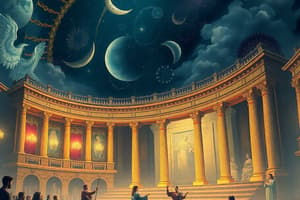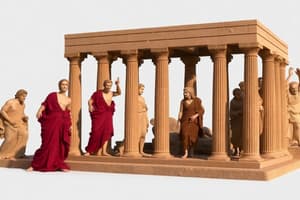Podcast
Questions and Answers
What is the term used to describe the purgation or cleansing of the emotions of pity and fear in the theatre?
What is the term used to describe the purgation or cleansing of the emotions of pity and fear in the theatre?
- Tragic Flaw
- Deep Comedy
- Deep Tragedy (correct)
- Hamartia
In ancient Greek plays, what role does the tragic flaw play?
In ancient Greek plays, what role does the tragic flaw play?
- It is a virtue of the protagonist
- It brings out the disaster of the protagonist (correct)
- It has no impact on the protagonist's fate
- It brings out the success of the protagonist
What is Oedipus' tragic flaw in Oedipus Rex?
What is Oedipus' tragic flaw in Oedipus Rex?
- Jealousy
- Cowardice
- Lack of courage
- Overweening pride (Hubris) (correct)
What model did English writers of drama follow during the Elizabethan age?
What model did English writers of drama follow during the Elizabethan age?
What is the term often used synonymously with 'tragic flaw'?
What is the term often used synonymously with 'tragic flaw'?
What influenced the development of tragedy in the Mediaeval period?
What influenced the development of tragedy in the Mediaeval period?
What was rediscovered during the Renaissance period?
What was rediscovered during the Renaissance period?
What is the result of the purgation of emotions in the theatre?
What is the result of the purgation of emotions in the theatre?
What is the significance of Harrison's statement about private reading?
What is the significance of Harrison's statement about private reading?
What is a tragic flaw, according to the Bedford Glossary of Critical and Literary Terms?
What is a tragic flaw, according to the Bedford Glossary of Critical and Literary Terms?
Flashcards are hidden until you start studying
Study Notes
Greek Tragedy
- Greek tragedies focus on the ideas of justice and vengeance in relation to human existence and suffering in the world.
- They explore the relationship between godly justice and human actions, highlighting the consequences of excessive pride (hubris) and the downfall of characters.
- Greek writers believed that gods did not approve of human greatness and would intervene to punish excessive pride.
Sophocles
- Sophocles' plays reflect the intense suffering of humans as a natural consequence of their own actions.
- Aristotle praised Sophocles' masterpiece Oedipus Rex for its dramatic conventions and plot construction.
- Sophocles' plays are still widely studied and performed today, with many considering him a master of Greek tragedy.
Menander
- Menander was born in 342 BC and is considered the chief proponent of New Comedy.
- New Comedy focuses on average characters, with no supernatural or heroic elements in its plot.
- Menander strongly influenced the development of European comedy, despite not being considered successful during his lifetime.
- He wrote over a hundred plays, but only one has survived.
Key Elements of Tragedy
- A well-constructed plot should have a proper beginning, middle, and end.
- The tragic hero should have a tragic flaw (hamartia) that leads to their downfall.
- The hero should not be perfectly virtuous or depraved, but rather have a weakness that leads to their reversal of fortune.
- Tragedy aims to evoke emotions of pity and fear in the audience, resulting in catharsis (purification) of these emotions.
Development of Tragedy
- In ancient Greek plays, the tragic flaw brings about the disaster of the protagonist, as seen in Oedipus Rex.
- In Mediaeval tragedy, the role of the tragic flaw is minimized, and the downfall of the protagonist is influenced by fate.
- During the Renaissance, classical tragedy was rediscovered, and Elizabethan Senecan tragedies emerged as a popular genre.
Studying That Suits You
Use AI to generate personalized quizzes and flashcards to suit your learning preferences.




